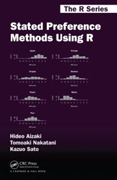
Explores the use of SP survey methods to measure people’s preferences Presents examples of CV, DCEs, and BWS based on actual and hypothetical empirical studies Includes data sets from agricultural and environmental economics Implements all the methods using R and provides the code and data sets on the authors’ website and CRAN and R-Forge Summary Stated Preference Methods Using R explains how to use stated preference (SP) methods, which are a family of survey methods, to measure people’s preferences based on decision making in hypothetical choice situations. Along with giving introductory explanations of the methods, the book collates information on existing R functions and packages as well as those prepared by the authors. It focuses on core SP methods, including contingent valuation (CV), discrete choice experiments (DCEs), and best–worst scaling (BWS). Several example data sets illustrate empirical applications of each method with R. Examples of CV draw on data from well-known environmental valuation studies, such as the Exxon Valdez oil spill in Alaska. To explain DCEs, the authors use synthetic data sets related to food marketing and environmental valuation. The examples illustrating BWS address valuing agro-environmental and food issues. All the example data sets and code are available on the authors’ website, CRAN, and R-Forge, allowing readers to easily reproduce working examples. Although the examples focus on agricultural and environmental economics, they provide beginners with a good foundation to apply SP methods in other fields. Statisticians, empirical researchers, and advanced students can use the book to conduct applied research of SP methods in economics and market research. The book is also suitable as a primary text or supplemental reading in an introductory-level, hands-on course.
- ISBN: 9781439890479
- Editorial: CHAPMAN & HALL LTD.
- Encuadernacion: Tela
- Páginas: 254
- Fecha Publicación: 15/08/2014
- Nº Volúmenes: 1
- Idioma:
